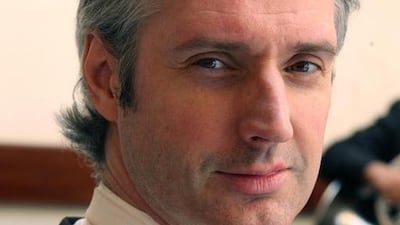For Paul MacAlindin, writing his first book was a therapeutic necessity. It came after he had devoted six years to establishing Iraq’s first youth orchestra – a beacon of culture in the middle of a war zone – only to see his efforts disintegrate as the country descended into civil war.
“I wanted to put it all behind me,” says MacAlindin.
The 48-year-old conductor, from Scotland, founded the National Youth Orchestra of Iraq in 2009, after an “incredibly serendipitous moment” when he spotted a story about a young Iraqi musician in a Glasgow newspaper.
Seven years later, after the rise of ISIL signalled a heartbreaking defeat, he documented his remarkable achievement in the memoir Upbeat.
“It devastated everybody, particularly me,” says MacAlindin.
“For six years, I’d worked every day of my life on this project.
“I was distraught, very depressed, and I realised the only way to dig myself out of the hole was to sit down and write it out from beginning to end – to reflect on what I learnt, to remind myself what we achieved, to say it wasn’t just a chunk of my life, but a chunk of history.”
MacAlindin, who had never seriously considered writing before, completed the 350-page, 130,000 word manuscript during a cathartic three-month purge at a friend’s home in Cologne.
He sent it to a bunch of publishers and, within a few days, was accepted by Sandstone Press, a tiny publisher in the Scottish Highlands, who released the book in August last year.
“My dad was a journalist, which helped me,” he says.
“I have a facility for writing. Whether it’s good or not, someone else can judge – but it’s not difficult to get it down on the page.”
The consensus is that his work is very good.
BBC Music Magazine described Upbeat as "fragile, precarious, quixotic and almost insanely heroic".
It also attracted high-profile praise from Julian Lloyd Webber and the late British composer Sir Peter Maxwell Davies, with whom MacAlindin worked at the beginning of the his career, in 1993, at the Scottish Chamber Orchestra, the BBC Philharmonic and the Royal Philharmonic.
His book – which was covered at length in The National's Review section – tells how MacAlindin answered the call of co-founder Zuhal Sultan, a headstrong teenage pianist who was the subject of that original newspaper story, and travelled to the Middle East for the first time in August 2009.
--------------------------------
Discord and harmony: how a youth orchestra flourished in Iraq against all the odds
--------------------------------
MacAlindin’s previous work in far-flung locations – conducting the New Zealand Symphony Orchestra and Armenian Philharmonic – did little to prepare him for the challenges of assembling an orchestra in a war-ravaged land, where there was little or no access to formal music education, and only one existing classical ensemble, the Iraqi Symphony Orchestra.
He assembled 33, largely self-taught, musicians in Sulaymaniyah for a two-week summer school. It was a divided group of Sunnis, shias and Kurds who did not even share a common language.
“The musicians were shut down emotionally,” he says.
“They were going through the motions of playing classical music but couldn’t connect with it.
“They were coming out of a war, in a country with no teachers, going through kind of underlying post traumatic stress disorder.”
Nevertheless, at the end of those two weeks, a concert was staged at the 1,300-capacity Palace of Arts.
MacAlindin returned each year, with the orchestra’s size, talents and reach quickly multiplying.
In 2011, the orchestra travelled to Germany to back star violinist Arabella Steinbacher at Bonn’s BeethovenFest. A year later, they toured the United Kingdom alongside cellist Lloyd Webber.
But as Iraq became more unstable and divided, the struggle to obtain funding intensified as a united national orchestra became a “political pariah”.
This taught him the hardest lesson of all: the “power of paradox”. “Classical musicians in a war zone – you can’t get more conflicted than that,” says MacAlindin.
“What these musicians achieved shows that everything is possible, with that kind of motivation and creative energy.”
Listen: Crossroads podcast: An Iraqi classical soundtrack- Ep 14
Paul MacAlindin will discuss Upbeat: The Story of the National Youth Orchestra of Iraq on Monday, March 6, at 7.30pm
rgarratt@thenational.ae

